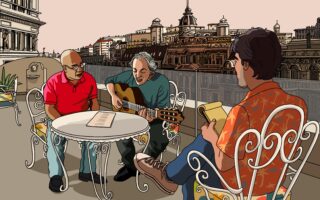‘Unclaimed’: Giving voice to the disappeared tuberculosis victims

A random leak at the Sotiria Hospital in 2015 revealed the belongings of hundreds of patients who died of tuberculosis in the previous century and were buried unnamed in mass graves in the hospital grounds.
Once Oscar-nominated director and producer Marianna Economou heard about the discovery and gained access to the belongings, it got stuck in her head and heart.
 This is how “Unclaimed” was born, aiming to reveal the hidden stories of tuberculosis patients secretly buried behind a wall at the hospital between 1945 and 1975. The documentary illustrates the truth of impoverished Greece and the social stigma surrounding tuberculosis 80 years later, bringing to life the “outcasts” through their belongings and “secret” correspondences.
This is how “Unclaimed” was born, aiming to reveal the hidden stories of tuberculosis patients secretly buried behind a wall at the hospital between 1945 and 1975. The documentary illustrates the truth of impoverished Greece and the social stigma surrounding tuberculosis 80 years later, bringing to life the “outcasts” through their belongings and “secret” correspondences.
“They were buried anonymously in mass graves. They have no names. Nobody claimed their belongings. It is as if they never existed and suddenly they appeared,” Economou tells Kathimerini English Edition.
“It was totally by chance that they were discovered and totally by chance that they were saved,” she says. They would most likely have been thrown away, if it wasn’t for the Sotiria seamstresses who saved them from heading to the trash heap.
The film was produced with small grants from the Hellenic Broadcasting Corporation and the Ministry of Culture, along with the Greek Film Center, through a program they initiated during the coronavirus pandemic to support filmmakers. It was a low-budget production, “which limited the selection of archives, as they were expensive,” she says. Nevertheless, using archival material, for the first time, photographs, radio programs and music from the 1950s and 60s, she has recreated a cogent depiction of the atmosphere of the post-war period.
As Economou describes it, “selecting which stories to tell was incredibly painful,” as she felt quite close to all the relatives. Ultimately, three main stories made the final cut, and with them, the stories of three relatives.
The documentary illustrates the truth of impoverished Greece and the social stigma surrounding the illness 80 years later, bringing to life the ‘outcasts’
Due to the social stigma surrounding tuberculosis at the time, Economou quickly understood that there was a lot of deception circling the deaths of the victims; the sons of two Sotiria patients did not even know their fathers had tuberculosis and died at the hospital.
“If a family had a member with tuberculosis, it was a family to avoid,” she says. One of the sons in the film only knew his father was a musician, nothing else. When he found out the truth, he said, “I always wanted to meet my father but when seeing his letters and his face, I didn’t know how to feel.”
The music composer of “Unclaimed,” Vangelis Fampas, used the discovered music score of the deceased musician to write the final track of the film. “The idea of the two musicians meeting through the music, 60 years later, is beautiful,” Economou says, “quite literally bringing them to life – that was the idea.”

The other son was lied to by his mother, who told him his father had gone away and wasn’t going to come back, but still didn’t tell him that he had died. “It is very revealing of how strong the social stigma was,” Economou says.
“The stories of the victims were abruptly stopped, with their relatives only holding loose ties to the truth. ‘Unclaimed’ provides closure to the suffering of the families and the descendants: There is a very deep human need to have closure,” she explained.

“A dream of mine is for the public to recognize the importance of this archive, the story, the Sotiria hospital, to honor the patients,” Economou says.
Her dream will materialize as there is currently a Sotiria museum and a historical archive under construction, which should be ready in a few months’ time. It includes medical equipment, hospital furniture, medical documents and the personal belongings of the patients.
The collection, directly related to the history of tuberculosis in Greece, is kept in the Military Pavilion of the Sotiria hospital, which was built in 1913 and altered by Sophia Schliemann, who served on its board of directors from 1919 until her death in 1932, and the statesman Eleftherios Venizelos. The Athens Art Conservation Studio made a collection condition survey in 2018 to plan the conservation of the archive, with its future goal being to rescue the collection, spread awareness of its historical significance, and provide open access to researchers, historians and the patients’ relatives.
To learn about the stories of the voiceless, their collective trauma and history, catch the documentary at Danaos cinema (109 Kifissias, Ambelokipi) from September 19 to 29 at 8 p.m.
Nafsika Polemis is an intern at Kathimerini English Edition and an undergraduate at UCL.





